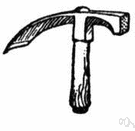adze
(redirected from adzing)Also found in: Thesaurus, Encyclopedia.
adze
or adz (ădz)n.
An axelike tool with a curved blade at right angles to the handle, used for shaping wood.
[Middle English adese, from Old English adesa.]
American Heritage® Dictionary of the English Language, Fifth Edition. Copyright © 2016 by Houghton Mifflin Harcourt Publishing Company. Published by Houghton Mifflin Harcourt Publishing Company. All rights reserved.
adze
(ædz) oradz
n
(Tools) a heavy hand tool with a steel cutting blade attached at right angles to a wooden handle, used for dressing timber
[Old English adesa]
Collins English Dictionary – Complete and Unabridged, 12th Edition 2014 © HarperCollins Publishers 1991, 1994, 1998, 2000, 2003, 2006, 2007, 2009, 2011, 2014
ThesaurusAntonymsRelated WordsSynonymsLegend:
Switch to new thesaurus
| Noun | 1. |  adze - an edge tool used to cut and shape wood adze - an edge tool used to cut and shape woodedge tool - any cutting tool with a sharp cutting edge (as a chisel or knife or plane or gouge) |
Based on WordNet 3.0, Farlex clipart collection. © 2003-2012 Princeton University, Farlex Inc.
